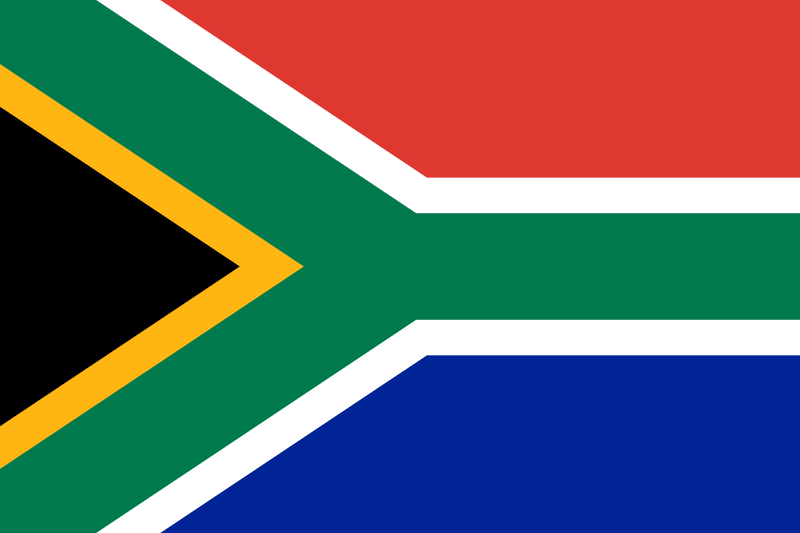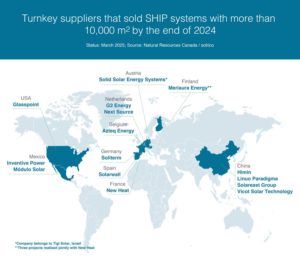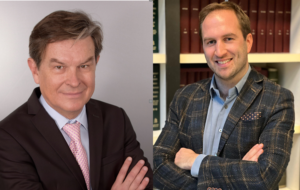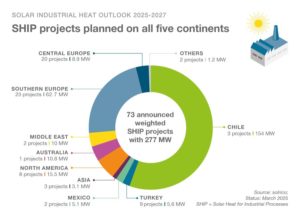

South Africa: Solar Thermal Experts Lecture at University of Pretoria
Learning from professionals: On 3 and 4 February 2014, solar thermal experts offered a specialist workshop on Solar Heat for Industrial Applications at the University of Pretoria. The 40 places for the workshop were exclusively limited to persons who had attended previous SOLTRAIN courses or who had experience with large solar water systems in Mozambique, Namibia, South Africa or Zimbabwe. Lesotho has also been part of the SOLTRAIN project since October 2013. “The best SOLTRAIN course ever,” was the positive response of the attendees, according to a press release sent out by Prof Dieter Holm, regional SOLTRAIN coordinator in South Africa.
Photo: Dieter Holm
The so-called Train-the-Trainer workshop is part of the Southern African Solar Thermal Training and Demonstration Initiative (SOLTRAIN), which is sponsored by the Austrian Development Agency (ADA). The workshop at the University of Pretoria was coordinated by the Sustainable Energy Society of Southern Africa (SESSA). Train-the-Trainer means that the recipients of the specialist training are committed to disseminating the knowledge they receive.
Suitable collector types and solar integration
On the first day of the workshop, the speakers familiarised the participants with the theoretical framework. For example, Werner Weiss, Managing Director of the Austrian Institute for Sustainable Technologies, AEE INTEC, gave a lecture on suitable collector types for industrial applications and compared their efficiency. Christoph Brunner, AEE INTEC, showed how solar thermal is integrated into industrial processes. He outlined the procedure for process optimisation and solar integration, solar thermal system designs, storage systems and the optimised integration point. Then, Franz Mauthner, AEE INTEC, presented designs of and experiences with installed systems using examples of breweries. Last but not least, Christian Zahler, Managing Director of German company Industrial Solar, illustrated the advantages of Fresnel collectors in industrial applications.
On the first day of the workshop, the speakers familiarised the participants with the theoretical framework. For example, Werner Weiss, Managing Director of the Austrian Institute for Sustainable Technologies, AEE INTEC, gave a lecture on suitable collector types for industrial applications and compared their efficiency. Christoph Brunner, AEE INTEC, showed how solar thermal is integrated into industrial processes. He outlined the procedure for process optimisation and solar integration, solar thermal system designs, storage systems and the optimised integration point. Then, Franz Mauthner, AEE INTEC, presented designs of and experiences with installed systems using examples of breweries. Last but not least, Christian Zahler, Managing Director of German company Industrial Solar, illustrated the advantages of Fresnel collectors in industrial applications.
Part two of the workshop included the presentation of a design study by Christoph Brunner and Franz Mauthner. This study about a solar process heat system was then discussed with the workshop’s participants.
Training: cost-effective way of creating decent long-term jobs
“South Africa and the Southern African Development Community (SADC) urgently need the expertise,” Prof Holm said, “and this is a cost-effective way of creating decent long-term jobs.” Project leader Werner Weiss concurred: “Southern Africa enjoys twice as much sunshine as Austria does.”
The University of Pretoria is South Africa’s and SADC’s leader in the use of solar water heating in student residences. The university is also building a thermal demonstration unit to be used for the experimental practice that the students require. The Pretoria campus is within the SOLTRAIN Solar Thermal Flagship District, across which various installations can be visited by interested tourists and political decision-makers.
Southern Africa boasts 59% of the world’s best winter sunshine area, but does not rank among the global solar thermal leaders. “Not yet,” Holm says, “but given enabling legislation and leadership by example when it comes to government buildings, we could create a sustainable and competitive solar water heating industry in the region and reduce our chronic electricity outages.”
More information:
Contact: dieterholm@worldonline.co.za


